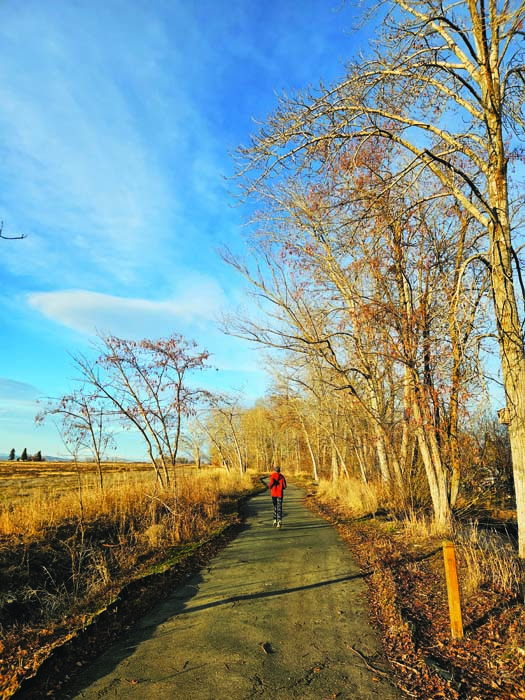New law restores liability protection for public trails
Published 8:00 am Wednesday, April 17, 2024

- The Leo Adler Memorial Parkway follows the Powder River through Baker City.
City and county officials are relieved by a new state law that they say reinstates protection from legal liability for public trails when hikers or other users get hurt.
Trending
But officials note that the protection for public agencies that maintain such trails isn’t permanent.
“It’s appropriate the legislature adopted a temporary fix this session, and we look forward to working in the 2025 legislative session towards a durable solution to protect access to free recreation,” said Scott Winkels, a lobbyist for the League of Oregon Cities.
The legislature passed Senate Bill 1576 during the month-long session that ended in early March.
Trending
Gov. Tina Kotek signed the bill into law on March 27.
The legislation was prompted by a lawsuit that Nicole Fields filed against the city of Newport in October 2020. In January 2019 she slipped on a wooden bridge the city owns, and broke her leg.
After a circuit court judge granted the city’s motion to dismiss the complaint based on Oregon’s recreational immunity law, the Oregon Court of Appeals overturned that ruling.
The appeals court judges concluded that a question existed as to whether or not Fields was using the bridge for recreational purposes. Given the uncertainty, the appeals court ruled, the city’s defense based on recreational immunity was a matter to be decided at trial.
Newport’s attorneys asked the Oregon Supreme Court to review the appeals court ruling, but in October 2023 the Supreme Court declined to do so.
The result, according to CIS Oregon, which provides liability insurance to most cities and counties, is that recreational immunity, as previously understood, was no longer in effect.
That prompted both CIS Oregon and the League of Oregon Cities to recommend that cities and counties consider taking action to protect themselves from liability if someone gets hurt on their trails.
Those recommendations included closing improved trails used to access a recreational area, as well as closing unimproved trails.
On the coast, Tillamook County has closed two trails this winter, both of which are in need of repairs. Steph Noll, director of the Oregon Trails Coalition, a group that advocates for public access to trails, said as many as 20 trails on the coast were temporarily closed, as well as two trails across private property that accessed public land.
No cities or counties in Northeast Oregon closed trails in response.
With the new law, however, CIS Oregon and the League of Oregon Cities have rescinded their recommendations to consider closing trails.
“All trails that were previously closed due to the Fields v. City of Newport court decision can now be reopened without undue risk to local government budgets and programs, “CIS Oregon wrote in a statement. “CIS is very happy to encourage local governments throughout Oregon to let their constituents know that all trails and recreational opportunities are open for business once again and will remain open throughout the summer season.”
Winkels, the lobbyist for the League of Oregon Cities, concurred.
“SB 1576 allows cities to open, and keep open, trails, bridges and staircases to allow Oregonians and their guests to recreate without carrying extra liability and risk for the public,” Winkels said.
Local reaction
Liam Hughes, director of Pendleton’s Parks, Recreation and Cemetery Commission, lauded the new law.
“It’s really big,” Hughes said. “There are some trails in the state that had closed that have now reopened. Here in Pendleton, we didn’t close any we were kind of watching to see what happened.”
“It’s also a really big deal for private landowners,” Hughes said. “If you think about the amount of private land that’s owned by timber companies or ranches or people like that, that allow the public to pass through their land to access national forest or to, in some cases, recreate on their land directly. This also adds that protection to those people as well as cities, counties, recreation districts, those types of entities.”
Joyce Bornstedt, Baker City’s public works and parks director, agreed with Hughes.
“The passage of SB 1576 restoring recreational immunity protections for landowners is great news,” Bornstedt said. “Given the litigious age we live in, it is essential that recreational property owners be given protections in order to continue to provide positive outdoors experiences to all citizens and visitors alike. Parks, pathways, and other outdoor recreational opportunities enhance communities and provide a multitude of benefits, including stress reduction, improved mental and physical health, and increased quality of life. Baker City is committed to providing optimal opportunities and outdoor facilities for exercise and recreation. Passage of this bill will allow us to continue doing that.”
Hughes pointed out, though, that the restoration of recreational immunity is temporary, as the provisions of the new law expire Jan. 2, 2026.
“I think the key thing is that this fix is temporary and it needs to get done right in the next legislative session,” Hughes said. “We’re not out of the woods yet.”
Noll said she understands why lawmakers, with the compressed time of the short session, added the sunset clause. That gives legislators time next year to consider possible changes to the law, she said.
However, Noll said she and other members of the trails coalition are pleased with the current language. The only thing they want now, she said, is to delete the sunset clause.
Noll said the new law’s language, which specifically mentions walking, biking and running as well as referencing improved and unimproved trails, should render moot the argument that Fields’ attorneys made, that she was walking on the Newport trail to get to the beach but not for a recreational purpose.
Noll pointed out that the legislation garnered overwhelming support from Democrats and Republicans.
The Senate passed the bill 25-2 (three senators were excused from the vote). The House approved the legislation 50-0 (10 representatives were excused).
Umatilla County Commissioner Dan Dorran called the new law “a huge step in the right direction.”
Dorran said commissioners were initially concerned about potential effects on the county’s trails at Harris Park near Milton-Freewater.
But CIS Oregon’s rescinding of its recommendation about possibly closing trails was “a huge, huge load off of us,” Dorran said.
He said the county is starting to build a new Umatilla River trail from Umatilla to Echo, which will include three bridges.
“It was important to make sure that we had clarity and where we stood on liability was very important,” Dorran said.









